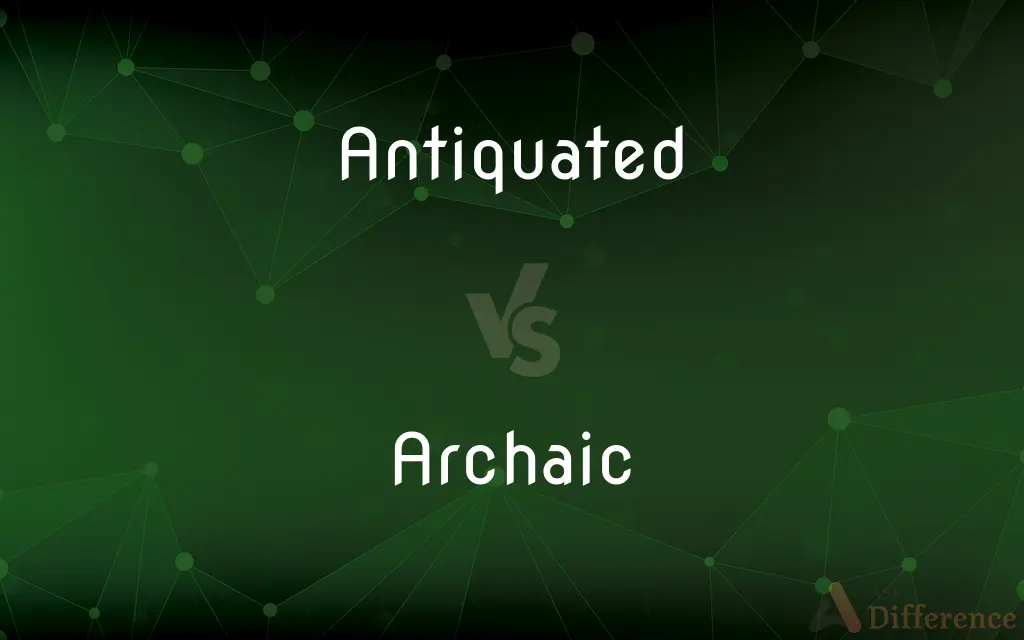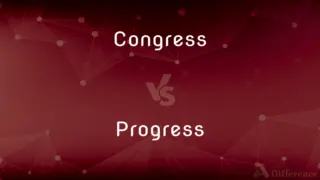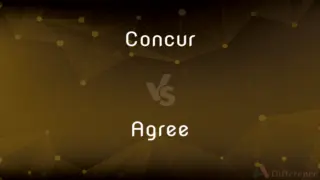Antiquated vs. Archaic — What's the Difference?
By Tayyaba Rehman & Urooj Arif — Updated on April 24, 2024
Antiquated refers to something outdated but still in use, while archaic describes something obsolete and from an earlier period.

Difference Between Antiquated and Archaic
Table of Contents
ADVERTISEMENT
Key Differences
Antiquated generally applies to objects or ideas that, despite being old-fashioned, are still in some use today. Whereas archaic suggests that something is not only old but also no longer in common use, often obsolete.
Antiquated often carries a slightly negative connotation, implying that something could be updated or replaced due to its age. On the other hand, archaic is more neutral and used to describe things that belong to an earlier time, emphasizing historical or evolutionary context.
Antiquated is commonly used in reference to systems, practices, or technologies that have become outdated. Whereas archaic is frequently used to refer to words, phrases, or styles of language that are no longer in everyday use.
In literature, antiquated might be used to describe a narrative style or theme that seems out of date to contemporary readers. Conversely, archaic terms or expressions in a text highlight its historical setting or the author's stylistic choice to evoke antiquity.
Regulatory frameworks or laws can be described as antiquated when they need modernization to align with current realities. Whereas archaic laws would typically be those that have fallen entirely out of practice, such as old blue laws originally intended to enforce moral standards.
ADVERTISEMENT
Comparison Chart
Usage
Still in use but outdated
No longer in common use
Connotation
Slightly negative
Neutral, historical
Common contexts
Technologies, systems
Language, terms
Implication
Needs updates or replacement
Belongs to an earlier time
Example in literature
Outdated narrative styles
Use of historically old expressions
Compare with Definitions
Antiquated
Pertaining to older methods or tools still in operation;
Some schools still use antiquated teaching methods.
Archaic
Relating to an earlier period, often historical;
The museum's archaic artifacts are from the Bronze Age.
Antiquated
Old but not obsolete;
The house's antiquated heating system was charming but inefficient.
Archaic
Obsolete or old beyond practical utility;
Archaic laws are often subjects of historical study.
Antiquated
Something outdated but still in use;
The antiquated computer system at the library struggled with new software.
Archaic
Reflecting the very old or ancient times;
Archaic sculptures at the gallery attracted history enthusiasts.
Antiquated
Considered old-fashioned and not the best available option;
He still drives an antiquated car that lacks modern features.
Archaic
Pertaining to something no longer in use, ancient;
Archaic words like thee and thou are rarely used today.
Antiquated
Reflecting a need for updates or modernization;
Their antiquated business practices couldn't compete in today's market.
Archaic
Used to describe old, outmoded language or customs;
He spoke in an archaic tone that mimicked old English literature.
Antiquated
Too old to be fashionable, suitable, or useful; outmoded.
Archaic
Also Archaic Relating to, being, or characteristic of a much earlier, often more primitive period, especially one that develops into a classical stage of civilization
An archaic bronze statuette.
Archaic Greece.
Antiquated
Very old; aged
"They were always chippering and chatting to each other, like a pair of antiquated house-sparrows" (Harriet Beecher Stowe).
Archaic
No longer current or applicable; antiquated
Archaic laws.
Antiquated
Old-fashioned, out of date
Archaic
Relating to, being, or characteristic of words and language that were once in regular use but are now relatively rare and suggestive of an earlier style or period.
Antiquated
Grown old. Hence: Bygone; obsolete; out of use; old-fashioned; as, an antiquated law.
Old Janet, for so he understood his antiquated attendant was denominated.
Archaic
Relating to or being an early or premodern evolutionary form of an organism or group of organisms
Archaic vertebrates.
Antiquated
So extremely old as seeming to belong to an earlier period;
A ramshackle antediluvian tenement
Antediluvian ideas
Archaic laws
Archaic
Relating to or being an early form of Homo sapiens or a closely related species, such as Neanderthal, that is anatomically distinct from modern humans.
Archaic
Archaic Relating to a Native American culture prevalent throughout much of North America from about 8000 BC to about 1000 BC, characterized especially by the development of Mesolithic tools and by the increased reliance on smaller game animals as the large Pleistocene mammals became extinct.
Archaic
A member of an archaic population of Homo.
Archaic
A general term for the prehistoric period intermediate between the earliest period (‘[http://en.wikipedia.org/wiki/Paleo-Indian Paleo-Indian]’, ‘Paleo-American’, ‘American‐paleolithic’, &c.) of human presence in the Western Hemisphere, and the most recent prehistoric period (‘Woodland’, etc.).
Archaic
(paleoanthropology) (A member of) an archaic variety of Homo sapiens.
Archaic
Of or characterized by antiquity; old-fashioned, quaint, antiquated.
Archaic
(of words) No longer in ordinary use, though still used occasionally to give a sense of antiquity and are still likely to be understood by well-educated speakers and are found in historical texts.
Archaic
(archaeology) Belonging to the archaic period
Archaic
Of or characterized by antiquity or archaism; antiquated; obsolescent.
Archaic
So extremely old as seeming to belong to an earlier period;
A ramshackle antediluvian tenement
Antediluvian ideas
Archaic laws
Archaic
Little evolved from or characteristic of an earlier ancestral type;
Archaic forms of life
Primitive mammals
The okapi is a short-necked primitive cousin of the giraffe
Common Curiosities
Why might a technology be considered antiquated?
A technology might be considered antiquated if it is outdated and has been superseded by more efficient alternatives but is still in use.
What is the main difference between antiquated and archaic?
Antiquated refers to something outdated but still in use, while archaic describes something that is no longer in use and considered obsolete.
Can literature be archaic?
Literature can contain archaic language or themes, particularly if it intentionally seeks to evoke or replicate a historical period.
How do antiquated and archaic differ in legal contexts?
In legal contexts, antiquated laws might still influence current laws but need updates, while archaic laws are typically no longer enforced or relevant.
What impact does using antiquated systems have on a business?
Using antiquated systems can hinder operational efficiency and competitiveness in a rapidly advancing market.
Can something be both antiquated and archaic?
Generally, something cannot be both because antiquated implies ongoing use, whereas archaic means it has fallen out of use entirely.
Can fashion be antiquated or archaic?
Fashion can be antiquated if it reflects styles no longer considered modern but still worn; archaic, however, would be used for styles that are historically outdated and not worn in any contemporary context.
Is Shakespeare's language considered archaic?
Yes, many of Shakespeare's words and phrases are considered archaic by today's standards.
How does the perception of antiquated differ from archaic in technology?
In technology, antiquated often refers to earlier versions still in some use, like older software versions, whereas archaic technology would not be used at all today.
What is an example of an antiquated but valuable artifact?
An example would be early computing machines like the ENIAC, which are outdated but hold historical significance.
What are some examples of archaic language?
Examples include words like "wherefore" (why), "betwixt" (between), and "thou" (you).
Can archaic elements be found in modern works?
Yes, modern works might incorporate archaic elements stylistically or to give a sense of antiquity or historical depth.
How do dictionaries handle archaic words?
Dictionaries typically mark archaic words clearly, often providing context for their historical use.
Is there a trend in reviving archaic or antiquated styles?
Yes, there can be cultural or artistic trends that revive archaic or antiquated styles for nostalgic or aesthetic reasons.
What might be a reason to preserve antiquated items?
Preserving antiquated items can be valuable for historical, educational, or aesthetic reasons, even if they are no longer practical for everyday use.
Share Your Discovery

Previous Comparison
Congress vs. Progress
Next Comparison
Concur vs. AgreeAuthor Spotlight
Written by
Tayyaba RehmanTayyaba Rehman is a distinguished writer, currently serving as a primary contributor to askdifference.com. As a researcher in semantics and etymology, Tayyaba's passion for the complexity of languages and their distinctions has found a perfect home on the platform. Tayyaba delves into the intricacies of language, distinguishing between commonly confused words and phrases, thereby providing clarity for readers worldwide.
Co-written by
Urooj ArifUrooj is a skilled content writer at Ask Difference, known for her exceptional ability to simplify complex topics into engaging and informative content. With a passion for research and a flair for clear, concise writing, she consistently delivers articles that resonate with our diverse audience.
















































